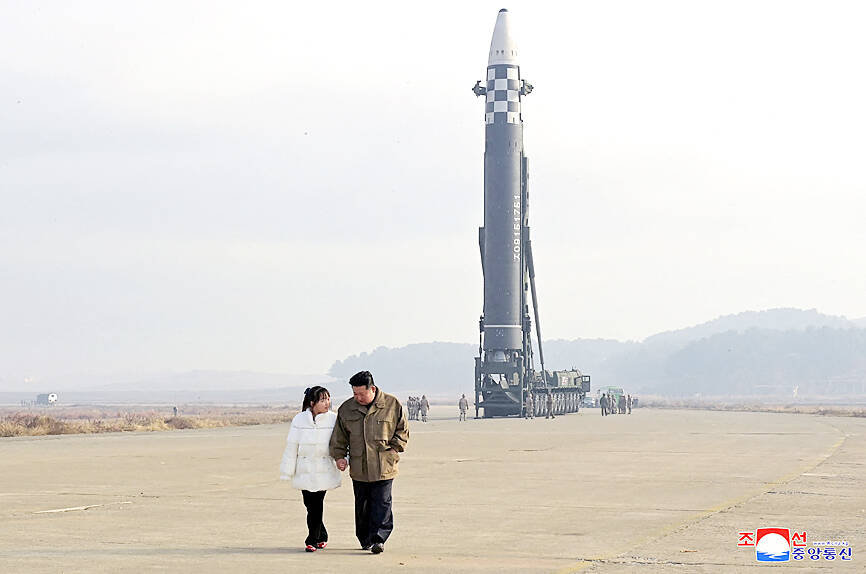North Korea yesterday threatened to take a “resolute and decisive military step” against Japan, while it criticized Tokyo’s adoption of a national security strategy as an attempt to turn the country into “an offensive military giant.”
Pyongyang’s statement came four days after Japan announced a security strategy that includes a counterstrike capability against enemy targets and doubles its military spending to gain a more offensive footing against threats from China and North Korea.
The North Korean Ministry of Foreign Affairs said in a statement that Japan’s push to acquire counterstrike capability has nothing to do with self-defense, but is a clear attempt to acquire “pre-emptive attack capability meant to launch strikes on other countries’ territories.”

Photo: Reuters
“Japan’s foolish attempt to satiate its black-hearted greed — the building up of its military invasion capability under the pretext of [North Korea’s] legitimate exercise of the right to self-defense — cannot be justified and tolerated,” a ministry spokesperson said in a statement carried by state media.
The statement accused the US of supporting and instigating the Japanese military ambitions, and undermining regional peace.
Such US moves are forcing North Korea to work hard to complete its plans to develop new strategic weapons to thwart enemy attempts to invade it, the statement said.
North Korea wants to make sure it can take “a resolute and decisive military step” to protect its sovereignty and national interests in the wake of the complexity of regional security caused by the Japanese strategy, it said.
“Our country will continue to take actions to show how much we are concerned and displeased with Japan’s unjust, greedy attempt to realize its wild ambitions,” the statement said.
North Korea’s pursuit of nuclear missiles is a major security concern for Japan.
The Japanese strategy names China as “the biggest strategic challenge” — before North Korea and Russia — to Tokyo’s efforts to ensure peace, safety and stability.
Chinese Ministry of Foreign Affairs spokesman Wang Wenbin (汪文斌) last week said that “hyping up the so-called China threat to find an excuse for [Japan’s] military buildup is doomed to fail.”
On Tuesday, South Korean Ministry of Foreign Affairs spokesman Lim Soo-suk reiterated a government position that Seoul wants Tokyo to seek its consent if it plans to take any actions that affect South Korean national security, such as the use of pre-emptive strikes on the Korean Peninsula.

NO HUMAN ERROR: After the incident, the Coast Guard Administration said it would obtain uncrewed aerial vehicles and vessels to boost its detection capacity Authorities would improve border control to prevent unlawful entry into Taiwan’s waters and safeguard national security, the Mainland Affairs Council (MAC) said yesterday after a Chinese man reached the nation’s coast on an inflatable boat, saying he “defected to freedom.” The man was found on a rubber boat when he was about to set foot on Taiwan at the estuary of Houkeng River (後坑溪) near Taiping Borough (太平) in New Taipei City’s Linkou District (林口), authorities said. The Coast Guard Administration’s (CGA) northern branch said it received a report at 6:30am yesterday morning from the New Taipei City Fire Department about a

IN BEIJING’S FAVOR: A China Coast Guard spokesperson said that the Chinese maritime police would continue to carry out law enforcement activities in waters it claims The Philippines withdrew its coast guard vessel from a South China Sea shoal that has recently been at the center of tensions with Beijing. BRP Teresa Magbanua “was compelled to return to port” from Sabina Shoal (Xianbin Shoal, 仙濱暗沙) due to bad weather, depleted supplies and the need to evacuate personnel requiring medical care, the Philippine Coast Guard (PCG) spokesman Jay Tarriela said yesterday in a post on X. The Philippine vessel “will be in tiptop shape to resume her mission” after it has been resupplied and repaired, Philippine Executive Secretary Lucas Bersamin, who heads the nation’s maritime council, said

REGIONAL STABILITY: Taipei thanked the Biden administration for authorizing its 16th sale of military goods and services to uphold Taiwan’s defense and safety The US Department of State has approved the sale of US$228 million of military goods and services to Taiwan, the US Department of Defense said on Monday. The state department “made a determination approving a possible Foreign Military Sale” to the Taipei Economic and Cultural Representative Office in the US for “return, repair and reshipment of spare parts and related equipment,” the defense department’s Defense Security Cooperation Agency said in a news release. Taiwan had requested the purchase of items and services which include the “return, repair and reshipment of classified and unclassified spare parts for aircraft and related equipment; US Government

More than 500 people on Saturday marched in New York in support of Taiwan’s entry to the UN, significantly more people than previous years. The march, coinciding with the ongoing 79th session of the UN General Assembly, comes close on the heels of growing international discourse regarding the meaning of UN Resolution 2758. Resolution 2758, adopted by the UN General Assembly in 1971, recognizes the People’s Republic of China (PRC) as the “only lawful representative of China.” It resulted in the Republic of China (ROC) losing its seat at the UN to the PRC. Taiwan has since been excluded from